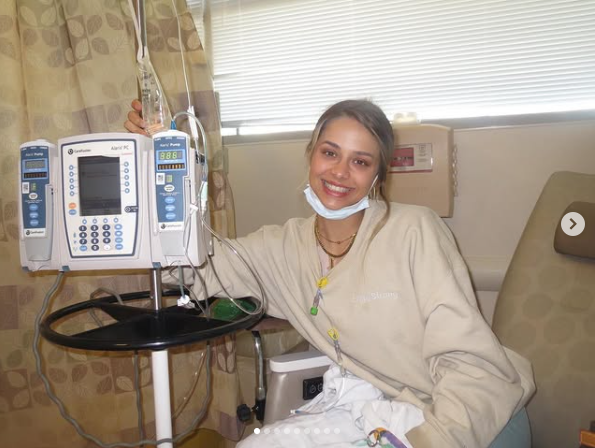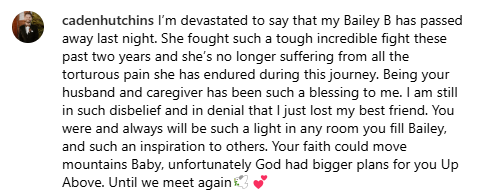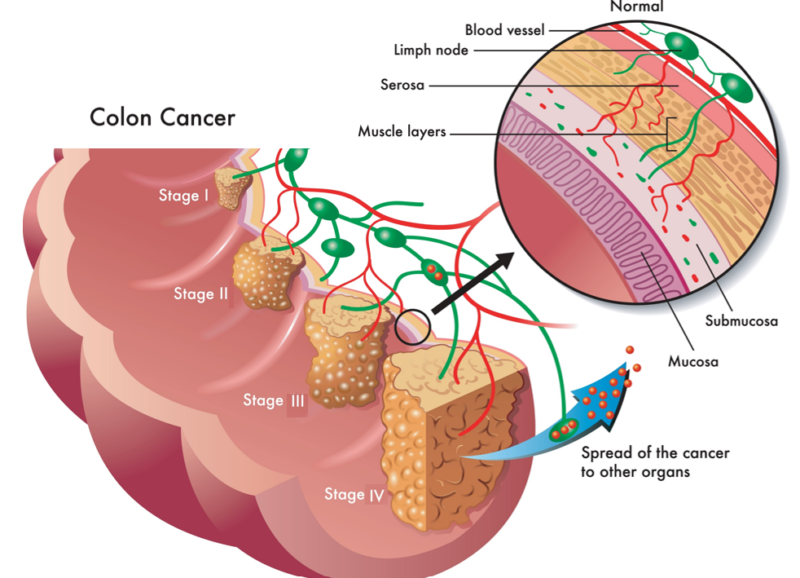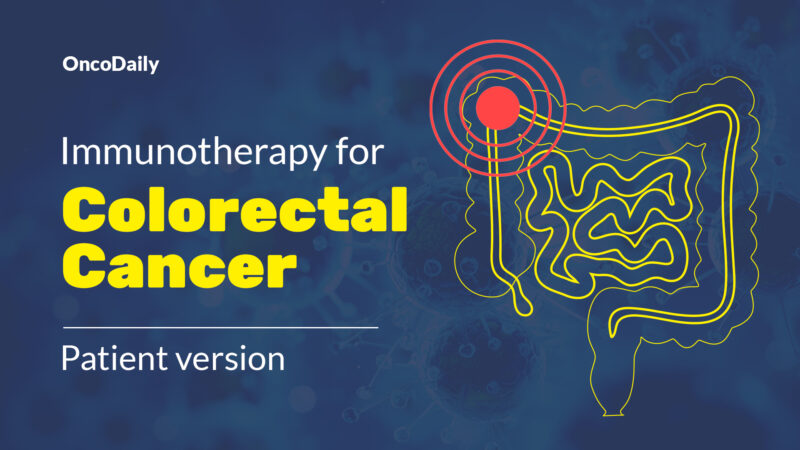Bailey Hutchins, a 26-year-old registered nurse and popular TikTok star known as @healingwithbailey, tragically passed away on February 7, 2025, after a courageous two-year battle with stage 4 colorectal cancer. Diagnosed in January 2023, Bailey openly shared her cancer journey, wellness tips, and insights into her marriage with her husband, Caden Hutchins, on TikTok, inspiring thousands with her strength and positivity. Her story became a beacon of hope, offering encouragement and support to others facing illness, and her legacy continues to resonate worldwide. Caden, who served as her devoted caregiver, confirmed her passing, praising her unwavering faith and the profound impact she had on so many lives.

Photo:Bailey Hutchins Instagram account
How Bailey Hutchins was Diagnosed with Colorectal Cancer?
Initially, she experienced very few symptoms, which is not uncommon for colorectal cancer, as early stages often present minimal or no noticeable signs. However, as her condition progressed, she began to face more significant health challenges.In her updates, Bailey mentioned that a mass on her colon was causing an obstruction, which ultimately led to her hospitalization.
Symptoms
Colorectal cancer in women can present with a range of symptoms, many of which may be linked to other conditions. Common signs include changes in bowel habits, such as diarrhea, constipation, or alterations in stool consistency, along with the feeling of incomplete evacuation or more frequent bowel movements. Blood in the stool is another key indicator, which may appear as bright red or darker, tarry stools, suggesting potential bleeding in the digestive tract (American Cancer Society, 2022). Abdominal discomfort, including persistent pain, cramping, bloating, or a sense of fullness, is also frequently reported (Mayo Clinic, 2023).
Unexplained weight loss, particularly without changes to diet or exercise habits, can be a sign of an underlying issue like colorectal cancer.
Fatigue, a common symptom in many cancers, can occur even after adequate rest, leaving women feeling unusually tired or weak. In addition, women may experience a feeling of fullness or bloating after eating small meals, often accompanied by a decrease in appetite. Ongoing blood loss from a tumor may lead to anemia, which can cause symptoms such as paleness, dizziness, or shortness of breath. Nausea or vomiting can occur if a tumor causes a blockage in the bowel.
While these symptoms can also be attributed to other conditions, it is important to seek medical attention if they persist, as early detection of colorectal cancer through screening is crucial for successful treatment.

Photo:Bailey Hutchins Instagram account
What Was Bailey Hutchins’s Initial Reaction to Her Diagnosis?
Bailey Hutchins’s initial reaction to her diagnosis of colon cancer was one of disbelief and shock. In a video she shared, she expressed that if someone had told her a year prior that she would be diagnosed with stage three colon cancer, she would have thought they were “freaking crazy”. This reaction underscores the unexpected nature of her diagnosis, especially since she reported having “nearly zero symptoms” leading up to it.Hutchins, who was a registered nurse, also noted that many medical professionals were surprised by the increasing prevalence of colon cancer among younger individuals, highlighting the alarming trend in diagnoses at a younger age.
What Was the Prognosis
Bailey Hutchins was diagnosed with stage 3 colon cancer in January 2023, but her prognosis worsened over time, ultimately leading to a diagnosis of stage 4 colorectal cancer with peritoneal metastasis. Despite her initial diagnosis, she faced significant challenges as the cancer progressed.
For young women diagnosed with stage 3 or stage 4 colorectal cancer, the prognosis can vary based on factors like overall health and tumor characteristics. Stage 3 colorectal cancer, where the cancer has spread to nearby lymph nodes but not to distant organs, has a five-year survival rate of about 70%, according to the American Cancer Society (2022). Younger patients may fare better due to their ability to handle aggressive treatments. Stage 4 colorectal cancer, where the cancer has spread to distant organs, has a five-year survival rate of approximately 14%.
What Treatment Did Bailey Hutchins Undergo for Colorectal Cancer?
Bailey Hutchins underwent a series of treatments during her battle with colon cancer, which included surgery and chemotherapy. After her initial diagnosis of stage 3 colon cancer in January 2023, she had a significant surgery where a majority of the tumor was removed, although the entire tumor could not be safely excised due to its attachment to her spleen and pancreas. Throughout her treatment journey, Bailey actively documented her experiences on social media, sharing insights and updates with her followers.

Chemotherapy days but make it ✨aesthetic✨
On a real note these are the photos I am going to show my kids one day. These photos represent and remind me that I am a FIGHTER and that I am FEARLESS. I have approached this battle head on with one goal in mind… to kicking cancers ass. I used to always doubt what I was capable and lack confidence in my abilities completely. However, now I have learned that I am unstoppable. Cancer may have stolen a lot from my life but I have also stolen a lot back. I have gained confidence, fearlessness, perseverance, and gratefulness to be ALIVE.
Cancer may be one of the worst things that has ever happened to me but it has also been a huge blessing. My whole perspective on life has switched and for that I am grateful. Cheers to being unstoppable 😉💙🎗️ 20 Jul 2023
Photo:Bailey Hutchins Instagram account
Support From Family and Friends
Bailey Hutchins received significant support from her husband, Caden Hutchins, and her family throughout her battle with colon cancer. Caden played a dual role as both her husband and caregiver, providing emotional and physical support during her challenging journey. In his heartfelt tribute following her passing on February 7, 2025, he expressed deep grief but also relief that Bailey was no longer suffering from the pain she endured. He described their relationship as a blessing, emphasizing the light she brought into his life and her inspirational presence to others.Bailey’s family, including her sister Ashley Rolfes, also rallied around her.
Ashley shared emotional reflections on social media, highlighting Bailey’s strength and the profound impact she had on those around her. The family’s support extended to organizing a GoFundMe campaign to help cover Bailey’s medical expenses, which showcased the community’s generosity and care for her well-being.Overall, the unwavering support from Caden and Bailey’s family was a crucial element in her journey, providing her with love, encouragement, and assistance as she faced the challenges of her illness.
Bailey Hutchins’s GoFundMe Campaign
Bailey Hutchins’s GoFundMe campaign was established to support her ongoing battle with stage 4 colorectal cancer, which included significant medical expenses related to her treatment. The fundraiser was organized by her sister-in-law, Chloe Hutchins, and aimed to alleviate the financial burden caused by multiple insurance changes and the need for alternative therapies not covered by insurance.As of February 12, 2025, the campaign had raised approximately $130,617 out of a $150,000 goal.
The funds were intended to cover critical treatments and therapies essential for Bailey’s comfort and recovery during her challenging journey with cancer. The family expressed deep gratitude for the overwhelming support they received from friends, family, and the community, emphasizing that every donation contributed directly to life-saving treatments.The GoFundMe page highlighted the unpredictability of Bailey’s health journey and the financial strain associated with her medical care. Despite the challenges, the family remained hopeful and appreciative of the kindness shown by supporters throughout Bailey’s fight against cancer.
How Bailey Hutchins Uses TikTok and Instagram to Raise Awareness About Cancer
Bailey Hutchins effectively used her TikTok platform, @healingwithbailey, to raise awareness about colon cancer and advocate for early detection. She shared her personal experiences with cancer treatment, including health updates, hospital visits, and the emotional toll of her diagnosis, offering followers a realistic perspective on living with cancer. By emphasizing the importance of recognizing early symptoms, she encouraged others to be proactive about their health and seek medical advice if they experienced concerning signs. Bailey also created a supportive community by offering encouragement and hope to those facing similar challenges, which resonated with many of her 170,000 followers.
Her content, ranging from informational videos to wellness tips and personal reflections, engaged a wide audience with her authenticity and strength. Beyond TikTok, she also participated in fundraising efforts through platforms like GoFundMe, further raising awareness about the financial burdens of cancer treatment. Bailey’s platform became a powerful tool for advocacy, education, and community-building around colorectal cancer awareness.
Bailey Hutchins February 11, 1998- February 7, 2025
Bailey Hutchins’s death was announced by her husband, Caden Hutchins, on Saturday, February 8, 2025, following her passing the night before on February 7 at 10:30 p.m. Caden shared the heartbreaking news on Instagram, expressing his devastation and reflecting on her strength during her two-year battle with colon cancer.

Condolences from OncoDaily
On behalf of the Oncodaily team, we extend our heartfelt condolences to the family and friends of Bailey Hutchins. Over the past two years, Bailey’s courage and strength in sharing her journey with colorectal cancer have inspired so many. Her unwavering commitment to raising awareness, advocating for early detection, and creating a supportive community has left an indelible mark. We are deeply grateful for her openness and the hope she spread to countless individuals facing similar challenges. Bailey’s legacy will continue to inspire and remind us all of the power of resilience and compassion. Our thoughts are with her loved ones during this difficult time.
What Causes Colorectal Cancer
Colorectal cancer is primarily caused by a combination of genetic, environmental, and lifestyle factors. Here are the key causes and risk factors associated with the development of colorectal cancer.
Genetic and Enviromental Factors
Genetic and environmental factors play a significant role in the development of colorectal cancer. Inherited genetic conditions such as Familial Adenomatous Polyposis (FAP) and Lynch syndrome can substantially increase the risk, as they involve mutations in specific genes that make individuals more susceptible to cancer, often at an early age (American Cancer Society, 2023). Additionally, having a close relative diagnosed with colorectal cancer, particularly at a young age, also heightens the risk. Family history of certain genetic conditions or polyps further contributes to this increased susceptibility (National Cancer Institute, 2023).
Environmental factors, such as exposure to certain chemicals and pollutants, can elevate the risk of colorectal cancer. For example, individuals working with or exposed to industrial chemicals like asbestos, pesticides, and solvents may face a higher risk (American Cancer Society, 2023). Furthermore, those who have undergone radiation therapy for other cancers are at an increased risk, as radiation can damage the cells of the colon, potentially leading to cancer (National Cancer Institute, 2023).

Lifestyle factors
Lifestyle factors and specific medical conditions play a significant role in the development of colorectal cancer. An unhealthy diet, particularly one that is high in red and processed meats such as bacon, sausage, and hot dogs, has been consistently linked to an elevated risk of colorectal cancer. Conversely, diets rich in fruits, vegetables, and fiber have been shown to reduce this risk (American Institute for Cancer Research, 2020).
Obesity is another key risk factor, with overweight and obese individuals, especially those with abdominal adiposity, being at a heightened risk, particularly for cancers of the upper colon (National Cancer Institute, 2023). A sedentary lifestyle, characterized by low levels of physical activity, has also been associated with an increased risk of colorectal cancer, whereas regular physical exercise has demonstrated a protective effect (American Cancer Society, 2023).
Additionally, excessive alcohol consumption is a known risk factor, with the risk increasing in correlation with the quantity of alcohol consumed (National Institute on Alcohol Abuse and Alcoholism, 2020). Tobacco use, particularly smoking, is a well-established risk factor for a range of cancers, including colorectal cancer, due to the presence of carcinogens in tobacco (American Cancer Society, 2023).
Diseases and Conditions
Medical conditions such as Inflammatory Bowel Disease (IBD), which includes chronic disorders like ulcerative colitis and Crohn’s disease, are associated with an increased risk of colorectal cancer due to prolonged inflammation in the colon, which may induce cellular changes that predispose the colon to malignancy (American Cancer Society, 2023). Furthermore, the presence of colon polyps, which are non-cancerous growths in the colon or rectum, may evolve into cancerous lesions over time, particularly adenomatous polyps, which are known to have a higher potential for malignancy if not detected and removed promptly (National Cancer Institute, 2023).

How to Prevent Colorectal Cancer
Lifestyle changes can play a significant role in reducing the risk of colorectal cancer. Adopting a healthy diet is one of the most effective measures. A diet rich in fruits, vegetables, and whole grains can lower the risk, with the recommendation to fill half your plate with these foods at every meal. Limiting red and processed meats is also important, as high consumption has been linked to increased colorectal cancer risk. Additionally, ensuring adequate fiber intake helps maintain bowel health and may reduce cancer risk.
Regular physical activity is another key factor in prevention. Engaging in at least 30 minutes of moderate exercise most days of the week can significantly lower the risk of developing colorectal cancer. Maintaining a healthy weight is equally essential, as being overweight or obese increases the likelihood of colorectal cancer. Achieving and maintaining a healthy body weight through a balanced diet and regular exercise is crucial.
Limiting alcohol consumption is also advised, as heavy drinking is associated with an increased incidence of colorectal cancer. Lastly, quitting smoking is one of the most important lifestyle changes, as smoking is a well-established risk factor for colorectal cancer. By making these lifestyle modifications, individuals can significantly reduce their risk of colorectal cancer and improve overall health.
Colorectal Cancer Screenings
Colorectal cancer screening is crucial for early detection and prevention. Several screening methods are available, each offering unique advantages and recommendations:
Colonoscopy is a procedure in which a flexible tube with a camera is used to examine the entire colon and rectum. It is recommended every 10 years for individuals at average risk starting at age 45. One of its main advantages is that it allows for the direct visualization and removal of polyps or abnormal tissue during the procedure. However, it requires thorough bowel cleansing beforehand and typically involves sedation.The Fecal Immunochemical Test (FIT) detects hemoglobin in stool samples, indicating possible bleeding from polyps or cancers. This test is recommended annually or biennially. It is non-invasive and does not require any dietary restrictions before testing.
The Guaiac Fecal Occult Blood Test (gFOBT) is similar to FIT but uses a chemical reaction to detect blood in stool samples. It is also recommended annually or biennially but requires dietary restrictions before testing due to potential false positives from certain foods.Multitarget Stool DNA Testing (sDNA-FIT) checks for DNA changes associated with colorectal cancer in stool samples. This test is more sensitive than FIT alone and is recommended every three years. It can detect a higher percentage of colorectal cancers.
You can also read Immunotherapy for Colon Cancer: Types, Success Rate, Side Effects & More by OncoDaily

Written by Aharon Tsaturyan , MD
FAQ
What causes colorectal cancer?
Understanding the causes of colorectal cancer is crucial for prevention. Common risk factors include genetic predispositions, age (especially individuals over 45), lifestyle factors such as diet and physical inactivity, and certain medical conditions like inflammatory bowel disease.
What are the symptoms of colorectal cancer?
Symptoms can vary but often include changes in bowel habits (diarrhea or constipation), blood in the stool, abdominal discomfort, unexplained weight loss, and fatigue. Early-stage colorectal cancer may not present noticeable symptoms, making regular screenings vital for detection.
How is colorectal cancer diagnosed?
Diagnosis typically involves a combination of medical history review, physical examinations, and diagnostic tests such as colonoscopy, imaging studies, and biopsies to confirm the presence of cancerous cells.
What was Bailey Hutchins's cause of death?
Bailey Hutchins passed away from complications related to stage 4 colorectal cancer after a two-year battle with the disease. She was diagnosed in January 2023, and her condition worsened over time, leading to her death on February 7, 2025.
How did Bailey Hutchins use TikTok to raise awareness?
Bailey utilized her TikTok account (@healingwithbailey) to document her cancer journey, share wellness tips, and provide insights into her life and marriage. Through her candid posts, she aimed to raise awareness about colorectal cancer and encourage others to seek early detection and support.
What impact did Bailey Hutchins have on her community?
Bailey was known for her positive outlook and resilience, inspiring many through her advocacy and personal story. Her journey resonated with followers who appreciated her openness about the challenges of cancer, fostering a sense of community among those facing similar struggles
How do TikTokers make money?
TikTokers can earn money through various avenues, including the TikTok Creator Fund, brand sponsorships, affiliate marketing, and merchandise sales. The Creator Fund compensates creators based on the engagement and views of their videos. Additionally, many TikTokers collaborate with brands to promote products, receiving payment for their endorsements.
How do TikTokers gain followers quickly?
Many users search for strategies to grow their audience, such as leveraging trending sounds, participating in viral challenges, and using TikTok's algorithm to optimize video timing and engagement.
